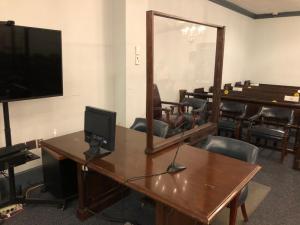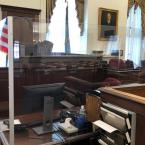Delaware jury trials to resume June 1
Delaware’s court system will return to holding jury trials starting Tuesday, June 1.
Sean O’Sullivan, spokesman for Delaware’s courts, said COVID protocols will be in place: Masks will be required, social distancing will be observed, and those entering the courthouses will have to undergo temperature checks. He said while courts can start holding jury trials June 1, the first trials in Sussex County will probably not get underway until mid-June.
The courtrooms themselves have been outfitted for increased health and safety. Jurors will sit in pods, which resemble a hockey penalty box with their chairs surrounded by plastic glass barriers. Alternate jurors will sit behind the prosecution table and also be in pods.
The judge, staff and witnesses also have plastic glass barriers surrounding their seats, while the defense and prosecution have dividers at their tables. Trial participants will not rise to speak at podiums as they did pre-COVID, but instead speak from their places. Although masks will be worn throughout the courthouse, those speaking during a trial, such as witnesses, judges and attorneys, can remove their masks while talking.
Jury selection for Superior Court trials will take place in the larger Courtroom 1, where prospective jurors will be separated by 3 feet of distance, while trials will be held in Courtroom 2.
Jury trials in Delaware have been on hold since March 2020 due to the COVID-19 pandemic, leading to a backlog of more than 1,500 cases in Superior Court alone. In Sussex County, the case backlog for Superior Court is 316. In lower courts like Justice of the Peace Court and Court of Common Pleas, the backlog is even greater: 15,600 pending cases in Court of Common Pleas and 28,000 in Justice of the Peace Court.
Sussex County Resident Judge Craig Karsnitz said the plan is to hold one trial at a time. He said public participation will be allowed, but how much will be determined on a case-by-case basis. Generally, family members and media will be allowed inside the courtroom, but Zoom could be used for cases where there is a great deal of interest.
“We’re going to do what we can to provide access,” Karsnitz said.
He said the court has been in consultation with an epidemiologist for guidance in order to make proceedings as safe for jurors as possible.
“We’ve taken what steps we can to make it work and keep people safe,” Karsnitz said.
He said the courts should be able to move cases along quickly, as judges can now give firm trial dates. While judges could do preliminary motions via Zoom – indeed, non-jury courts like Court of Chancery and Delaware Supreme Court have no backlog – they could not give trial dates because they did not know when trials might resume.
“What moves cases in our court is trial dates, not necessarily trials. When we’re able to set trial dates and people see that a trial is going to happen, they get much more serious about getting them resolved. The caseload is very daunting, but I think we have things in place to address it and move along,” Karsnitz said.




























































